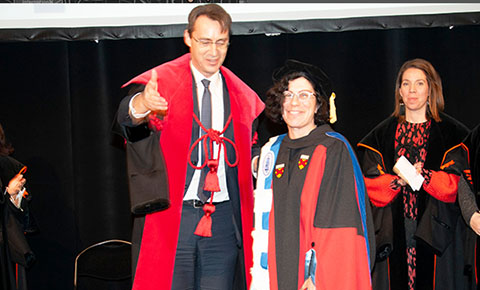Coburn Receives Honorary Doctorate
 Northwestern University’s Cynthia Coburn received an honorary doctorate from Universite Catholique de Louvain (CU Louvain) for her research uncovering the complicated factors and relationships that affect how educational policy is implemented in urban school systems.
Northwestern University’s Cynthia Coburn received an honorary doctorate from Universite Catholique de Louvain (CU Louvain) for her research uncovering the complicated factors and relationships that affect how educational policy is implemented in urban school systems.
A world-renowned expert on partnerships between educational researchers and practitioners (including teachers, principals and district leaders), Coburn has helped spark a renaissance in the field of educational research.
“Ultimately, our goal is to understand what helps and hinders how we use research in policymaking, and importantly, to create tools and resources so practitioners can use this evidence in their classrooms and schools,” said Coburn, professor of learning sciences and human development and social policy at the School of Education and Social Policy.
Coburn and two others -- professors Naomi Ellemers of the Netherlands’ Universiteit Utrecht, and James Gross of Stanford University -- received the doctorates in conjunction with the 50th anniversary of the founding of the university. It’s also the 10th anniversary of the founding of the research institute, Institut de recherché en sciences psychologiques.
Coburn dedicated her degree to her grandmother, Frances Coburn, a teacher and activist who worked with the NAACP and the Urban League to help desegregate the public schools in her small rural Michigan community in the 1950s. “My grandmother never got much recognition for the work she did,” Coburn said. “She deeply believed in the power of public schooling to address social wrongs.”
Coburn, who shares her grandmother’s passion for teaching and social justice, is particularly interested in how new practices, rules, and roles promoted by policies weave through the system and make their way into classrooms. She also studies how teachers and others respond to these policies in ways that transform, disrupt, or even reproduce the status quo that the policies were designed to change.
Using examples from her own research and others in the field, Coburn argued that changing policies is a learning process, one that’s shaped by the reaction of those affected by the new rules. “Policy implementation is also how actors engage with these new ideas and practices; this can lead to stability or change in the social structure,” she said.
She stressed helping teachers and school leaders meaningfully interact with their colleagues can ease the process. In several studies, she’s shown that teachers who had the chance to discuss policy ideas with colleagues of differing backgrounds “were more likely to rethink their existing approaches to instruction rather than implement ideas by layering them on top or rejecting them,” she said.
“Similarly, I’ve shown that when district leaders have time and space to engage with new policy ideas in more substantive ways, they developed more innovative approaches to implementing them in the districts, rather than utilizing approaches they had used in the past.”
Ultimately, Coburn argues that policies don’t change social structures, people do. The process is fundamentally social and interactive. “A policy may change a rule,” she said. “It may promote a new practice or procedure. It may create a new position or alter an existing one. But these changes are simply words on a page until they are acted on by people at different levels of the system.”